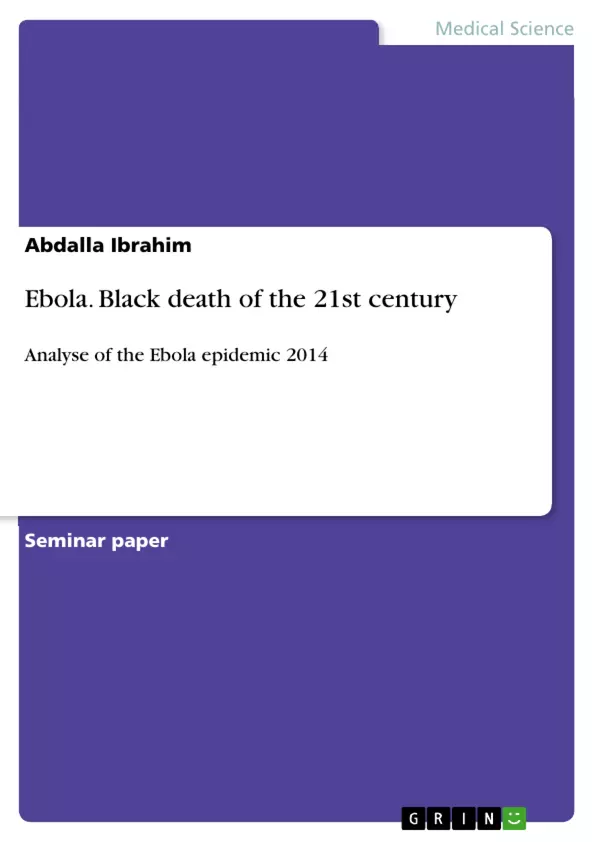Ebola is a viral disease caused by several viruses and the disease is known as Ebola hemorrhagic fever. Humans are not the natural host for it and can not be carriers. Infection is contracted by contact with carrier animals in different ways. Humans become infectious during the sickness period especially in crowded places and where culture embraces close body contact with family and friends as the disease spreads by body fluids. Generally Ebola is not a disease that might lead to an epidemic due to several reasons, the fact that there are no human carriers, the replication time of the Ebola virus makes its transmission rate limited to 1.8% and normally it kills the host before it spreads. What led to this epidemic becoming the largest of Ebola is the question to answer (PHMS, 2014).
Inhaltsverzeichnis (Table of Contents)
- Introduction
- Globalization and Ebola
- Ebola, Health and Health Systems
- Ebola and the work of organizations
- The way forward...
Zielsetzung und Themenschwerpunkte (Objectives and Key Themes)
This article analyzes the Ebola epidemic of 2014, focusing on its origins, global implications, and the role of international organizations in responding to the crisis. It examines the interplay between global governance, healthcare systems, and the spread of infectious diseases.- The emergence and spread of Ebola in West Africa, particularly in Sierra Leone
- The limitations of global health governance in responding to infectious disease outbreaks
- The impact of globalization on disease transmission and the need for stronger international cooperation
- The role of healthcare systems in preventing and managing infectious disease outbreaks
- The need for increased investment in research and development of vaccines and treatments for Ebola
Zusammenfassung der Kapitel (Chapter Summaries)
- Introduction: The article begins by introducing the Ebola virus, its transmission, and the factors that contributed to the 2014 epidemic in Sierra Leone. It highlights the country's weak healthcare system and high poverty rates, which created a vulnerable environment for disease spread.
- Globalization and Ebola: This section examines the challenges of global governance in responding to global health emergencies like Ebola. It critiques the limitations of international organizations, particularly the World Health Organization (WHO), in effectively coordinating and leading global responses to health crises. The author argues that the lack of clear global governance structures and the prioritization of economic interests over health concerns contributed to the delayed and inadequate response to the Ebola outbreak.
- Ebola, Health and Health Systems: This chapter focuses on the impact of Ebola on health systems and individuals in Sierra Leone. The article points to the country's weak healthcare infrastructure, lack of resources, and cultural practices that contributed to the spread of the disease. It emphasizes the importance of strengthening healthcare systems globally to effectively manage and prevent outbreaks.
- Ebola and the work of organizations: This section analyzes the role of various organizations in responding to the Ebola epidemic. It highlights the efforts of international organizations like the WHO, UN, and World Bank, as well as non-governmental organizations like Doctors Without Borders (MSF), in providing financial and logistical support to affected countries. The author also examines the national response in Sierra Leone, including the implementation of quarantine measures and other public health interventions.
- The way forward...: This chapter proposes a reform of the WHO to strengthen its leadership role in global health governance. It argues that the WHO should become a more decisive and powerful entity in setting global health norms, coordinating international responses, and supporting national health systems. The article discusses the potential advantages and challenges of such a reform, considering different perspectives from various global actors.
Schlüsselwörter (Keywords)
The primary focus of this article is on global health governance, Ebola epidemic, infectious disease outbreaks, international organizations, WHO, healthcare systems, globalization, poverty, and public health interventions. The work examines the challenges of responding to global health emergencies and highlights the need for increased cooperation, resource allocation, and system strengthening to mitigate future outbreaks.Frequently Asked Questions
What caused the 2014 Ebola epidemic to become the largest in history?
A combination of weak healthcare systems, high poverty rates, cultural practices involving close body contact, and a delayed international response contributed to its scale.
How is the Ebola virus transmitted to humans?
Infection is contracted through contact with carrier animals or by direct contact with the body fluids of an infected person during the sickness period.
Why did global health governance fail to respond quickly?
Limitations in the WHO's leadership, a lack of clear governance structures, and the prioritization of economic interests over health concerns led to an inadequate initial response.
What was the role of organizations like MSF (Doctors Without Borders)?
NGOs like MSF were often the first on the ground, providing critical medical care and logistical support when national systems and larger international bodies were overwhelmed.
What reforms are suggested for the WHO?
The article suggests strengthening the WHO's leadership role, making it a more decisive entity in setting global health norms and coordinating international emergency responses.
- Quote paper
- Abdalla Ibrahim (Author), 2014, Ebola. Black death of the 21st century, Munich, GRIN Verlag, https://www.grin.com/document/283800



